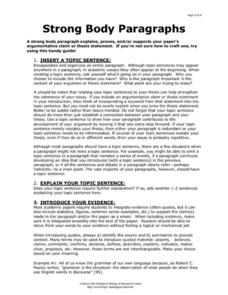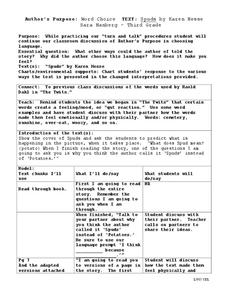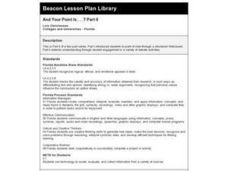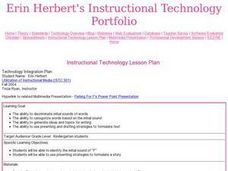EngageNY
Revising for Organization and Style: Bold Beginnings
Get young writers thinking about how to write a great beginning for their narratives. After examining examples of solid beginnings in literary text, young writers discuss the criteria for a compelling introduction. Then, independently,...
Odegaard Writing & Research Center
Strong Body Paragraphs
Here's a handy, seven-step guide to crafting good paragraphs in support of a claim. The steps are clearly explained and examples provided.
Curated OER
Notetaking Procedures
Sixth graders explore notetaking procedures. In this study skills lesson, 6th graders use text organizers to categorize information. Students select textbook sections and write headings, subheadings, and summary phrases for each...
University of California
Student Workbook: Reading Comprehension
Teach your class five reading strategies to help them with reading informational texts and literary texts. This packet, designed to help learners prepare for the CAHSEE, provides specific strategies that could be used to help prepare for...
Ontario
Sample Guided Reading Lesson for Emergent Readers
Give your guided reading lesson plan a boost with a sample lesson plan designed to reinforce academic content covered in previous assessments. The sample plan describes how the story and activities were chosen and offers the...
Curated OER
Synonyms and Antonyms
Mix up your writing lessons by having kids look at recent newspaper articles instead of their own work. They work in pairs and rewrite sports news articles using synonyms and antonyms for a set number of words. Then they share their work...
Curated OER
Author's Purpose
A simple activity for young readers, this introduces the idea of author purpose. Learners analyze various types of texts (newspaper articles, magazines, books, advertisements, etc.) and determine if the author's purpose for writing was...
Curated OER
Word Purpose
Third graders chunk text while reading it. In this language arts lesson, 3rd graders determine the author's purpose for calling certain things the names they are called like spuds for potatoes. Students discuss how words affect the...
Pennsylvania Department of Education
Comparing Key Ideas and Details in Fiction and Nonfiction
Learners recognize the differences between fiction and nonfiction texts. For this genre study lesson, students discuss what nonfiction means and write the definition. Learners listen to a read aloud and vote whether the text is fiction...
Curated OER
Energy
Scientific terms can be difficult to remember. This resource suggests developing analogies as a way to make energy terms memorable. After listing new terms on the board, groups develop analogies based on restaurant words, and then share...
Curated OER
An Air-Powered Car
Youngsters read text about an environmentally-friendly car. They try to figure out the meaning of the vocabulary in the text and discuss issues related to alternative energy sources. This thoughtful, well-designed plan has all the...
Utah Education Network (UEN)
Boxing and Analysis
Model for your high schoolers how to prepare for the essay portion of the AP Literature exam. For guided practice, pairs analyze metaphor, simile, tone or syntax in Norman Mailer’s “The Death of Benny Paret,” and then work independently...
Curated OER
Connotation and Denotation: How Word Choice Affects a Paragraph
Review the terms denotation, connotation, diction, and mood in paragraph writing. After defining the terms, middle schoolers practice writing examples of both connotation and denotation. They complete a connotation and denotation...
Curated OER
Using Punctuation Correctly
A PowerPoint presentation outlines the basic rules for correct comma usage. Viewers then edit texts for correct comma usage, identify which rules are being addressed, and complete worksheets as needed. The PowerPoint is included;...
Curated OER
And Your Point Is . . .? Part II
After researching recent community or political issues, paired with a review of proper debate format, class members select a topic, adopt a side, and prepare for a debate. The value in this resource is the review of debate procedures,...
Curated OER
Knowing Write from Wrong
Explore how the informality of electronic correspondence has affected communications in the workplace. Writers develop pages for a basic writing guide that contains rules and examples to help correct common writing errors. A great way to...
Curated OER
CLIL: A Lesson Plan
Students explore Vancouver. In this Vancouver geography and English language building instructional activity, students brainstorm what they know about Vancouver and predict what their text will cover. Students listen to the informational...
Curated OER
Fantastic Facts
Fourth graders are introduced to expository texts. They dwell to formulate the comprehension and gain the main ideas. Students encounter explicit comprehension strategies to help them transition into this new type of text.
Shmoop
ELA - Literacy.CCSS.ELA-Literacy.RST.9-10.6
Key to understanding scientific or technical texts is identifying the underlying question the author is attempting to answer. Provide your young scientists with an opportunity to practice identifying these questions and the procedures...
Curated OER
Teaching Grammar in Context: Using Sentence Combining to Teach Subordination
Reinforce sentence styles with this lesson, which prompts young grammarians to build complex and compound-complex sentence structures. They respond to non-print text and identify subordinators as parts of speech procedure. They spell...
Curated OER
What's that Mammal?
Learning by example is always effective if it's paired with independent practice opportunities! Model good reading practices for your class. Learners listen to the teacher model examples of reading with voice, expression, and tone...
Curated OER
Watch Out Books! I'm Reading with Expression!
Students discover how to read with expression. By reading and rereading decodable words in connected texts, students study the importance of expressions and how it can make a book more enjoyable.
Curated OER
Simply Speaking
Emerging orators distinguish between effective and ineffective public speaking strategies. They read a text that fits in with a Native Americans unit and speak about the text with both ineffective and effective volume, tone, phrasing,...
Curated OER
Fishing For F's
Students discriminate initial sounds of words and categorize words based on the initial sound. They generate ideas and topics for writing and use prewriting and drafting strategies to formulate text.























